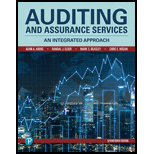
Auditing And Assurance Services
17th Edition
ISBN: 9780134897431
Author: ARENS, Alvin A.
Publisher: PEARSON
expand_more
expand_more
format_list_bulleted
Question
Chapter 24, Problem 13RQ
To determine
Discuss the comparison and contrast the accumulation of audit evidence and the evaluation of the adequacy of the disclosures in the financial statements. Also, provide two examples in which adequate disclosure could depends hevaily on the accumulation of evidence and two others in which audit evidence does not normally significantly affect the adequacy of the disclosure.
Expert Solution & Answer
Want to see the full answer?
Check out a sample textbook solution
Students have asked these similar questions
I need the correct answer to this general accounting problem using the standard accounting approach.
I am searching for the accurate solution to this general accounting problem with the right approach.
Please provide the correct answer to this general accounting problem using valid calculations.
Chapter 24 Solutions
Auditing And Assurance Services
Ch. 24 - Prob. 1RQCh. 24 - Explain why an auditor is interested in a clients...Ch. 24 - Prob. 3RQCh. 24 - Prob. 4RQCh. 24 - Prob. 5RQCh. 24 - Prob. 6RQCh. 24 - Prob. 7RQCh. 24 - Prob. 8RQCh. 24 - What major considerations should the auditor take...Ch. 24 - Identify five audit procedures normally done as a...
Ch. 24 - Prob. 11RQCh. 24 - Prob. 12RQCh. 24 - Prob. 13RQCh. 24 - Prob. 14RQCh. 24 - Prob. 15RQCh. 24 - Prob. 16RQCh. 24 - Prob. 17RQCh. 24 - Prob. 18RQCh. 24 - Prob. 19RQCh. 24 - Prob. 20.1MCQCh. 24 - Prob. 20.2MCQCh. 24 - Prob. 20.3MCQCh. 24 - Prob. 21.1MCQCh. 24 - Prob. 21.2MCQCh. 24 - Prob. 21.3MCQCh. 24 - Prob. 22.1MCQCh. 24 - Prob. 22.2MCQCh. 24 - Prob. 22.3MCQCh. 24 - Prob. 23.1MCQCh. 24 - Prob. 23.2MCQCh. 24 - Prob. 23.3MCQCh. 24 - Prob. 24DQPCh. 24 - Prob. 25DQPCh. 24 - Prob. 26DQPCh. 24 - Prob. 28DQPCh. 24 - Prob. 29DQPCh. 24 - Prob. 32DQPCh. 24 - Prob. 33DQP
Knowledge Booster
Similar questions
- Can you solve this general accounting problem using appropriate accounting principles?arrow_forwardSarah is the president and general manager of the operation. Sarah has been very proactive in growing the business. She has met with her banker to discuss expanding the facilities and equipment with another $150,000 loan. Their first loan for $150,000 was secured by the industrial-size food production equipment purchased with the loan. The banker now demands an audit of the corporate financial statements before releasing another loan to the company. Sarah has offered to place the corporate account receivables up as collateral to secure the second loan. Based on revenue projections by her sister Jillian's sales team, Sarah believes that the company will not have trouble paying down the loan in a short period of time. Kim's assistant, Henry, monitors the production and shipment of Smackey Dog Food's regular line of products. Henry takes pride in his work and is involved in every facet of the operation. With only one other warehouse employee to help, Henry personally is involved in…arrow_forwardI need assistance with this financial accounting problem using appropriate calculation techniques.arrow_forward
- Dodge Industries has the following data: direct labor $185,000, direct materials used $210,000, total manufacturing overhead $195,000, and beginning work in process $45,000. Compute total manufacturing costs and total cost of work in process.arrow_forwardI am looking for the most effective method for solving this financial accounting problem.arrow_forwardTreadway Equipment acquired manufacturing machinery at the beginning of the year at a cost of $86,000. The machinery has an estimated residual value of $5,500 and an estimated useful life of 5 years. Determine the second-year depreciation using the straight-line method.arrow_forward
arrow_back_ios
SEE MORE QUESTIONS
arrow_forward_ios
Recommended textbooks for you
 Auditing: A Risk Based-Approach to Conducting a Q...AccountingISBN:9781305080577Author:Karla M Johnstone, Audrey A. Gramling, Larry E. RittenbergPublisher:South-Western College Pub
Auditing: A Risk Based-Approach to Conducting a Q...AccountingISBN:9781305080577Author:Karla M Johnstone, Audrey A. Gramling, Larry E. RittenbergPublisher:South-Western College Pub Auditing: A Risk Based-Approach (MindTap Course L...AccountingISBN:9781337619455Author:Karla M Johnstone, Audrey A. Gramling, Larry E. RittenbergPublisher:Cengage Learning
Auditing: A Risk Based-Approach (MindTap Course L...AccountingISBN:9781337619455Author:Karla M Johnstone, Audrey A. Gramling, Larry E. RittenbergPublisher:Cengage Learning

Auditing: A Risk Based-Approach to Conducting a Q...
Accounting
ISBN:9781305080577
Author:Karla M Johnstone, Audrey A. Gramling, Larry E. Rittenberg
Publisher:South-Western College Pub

Auditing: A Risk Based-Approach (MindTap Course L...
Accounting
ISBN:9781337619455
Author:Karla M Johnstone, Audrey A. Gramling, Larry E. Rittenberg
Publisher:Cengage Learning
